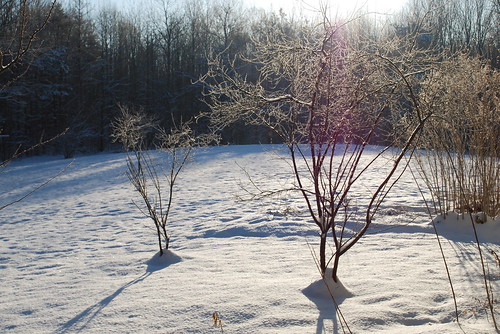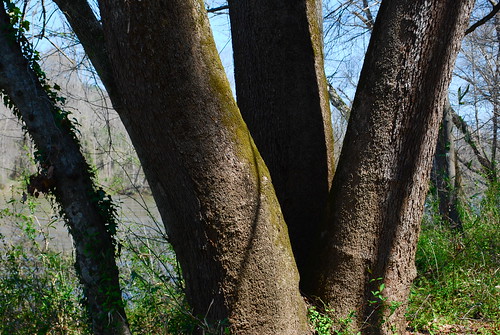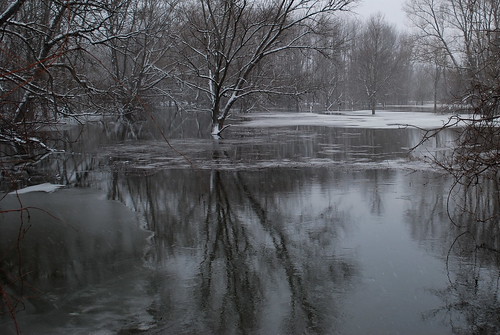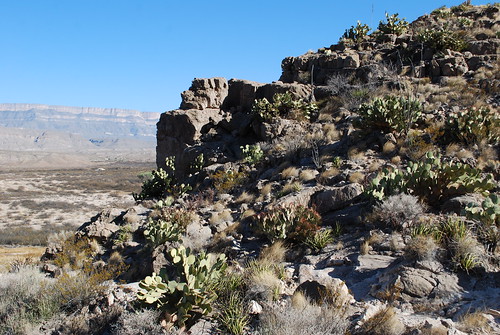Last weekend With-a-Why went off on a three-day field trip with his art teachers to Big City Like No Other. He packed for the trip by shoving an extra shirt and a pair of mittens into his backpack, but assured me that he had his cell phone with him in case of emergency. He’s the baby of the family, so it still feels strange that he’s old enough to go off by himself, even when I know that he’s with other students and a bunch of teachers.
It was reassuring to get text messages from him at odd moments of the weekend. The first came soon after my husband had dropped him off: “I thought I was on the wrong trip when I got on the bus. There were like 40 girls there but no guys. And they all packed like they were going on a 3-month trip to England. Seriously, if you can’t carry your life on your back, you’re doing something wrong.”
It was almost 24 hours later when I got another brief message: “I like art. I hate tour guides.”
That evening, a text chimed in: “I had granola bars in my pocket at the beginning of the day. They’re gone now. Either there’s a really disappointed pick-pocket somewhere, or I dropped them in a museum. Hope they don’t think they’re supposed to be some kind of modern art exhibit. Keeping on the cutting edge of the avant-garde as always.”
Every text message went to all of us – his three siblings, me, and my husband — his family back here who could read between the words and see that he was having a good time.
March 29, 2011
March 27, 2011
If spring will come
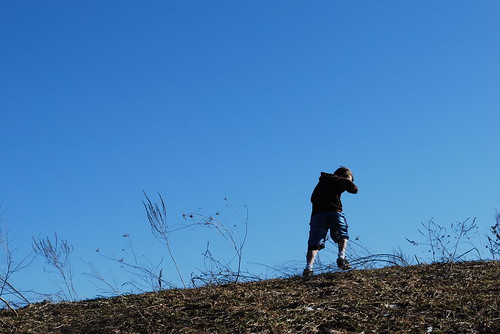
I spent all day Saturday and most of today indoors, grading papers. But then this afternoon, Little Biker Boy called. He sounded frustrated, like he needed to get out of the house.
I was in the same mood.
Spring hasn't exactly arrived here yet. We've got snow on the ground, despite the buds on the lilac bushes. The spring peepers are still silent. And it was cold today, cold enough for my winter coat and mittens.
But Little Biker Boy insisted on wearing shorts. "It's almost summer," he said. I think he believes that if he just wishes hard enough for what he wants, it might happen.
I decided to take him to my parents' house, figuring we could go for a walk there. My mother made him cocoa and fed him cookies, and my father showed him artwork. Then we went out back to run up and down the hills, breathing in the cold wind and sunshine.
March 26, 2011
We met at the bin of consonants and vowels
The concert Wednesday night went late, and we had 150 miles to drive to get home. Unfortunately, what had seemed like a great spot near the entrance to the parking lot meant that we were trapped by other cars as they left. We were both hyped up from the great music we’d just heard, and all the talking we’d done earlier that evening.
Kindergarten Friend, at the wheel of the car, put in a CD and cranked it up high so we’d have something to listen to while we waited. I looked out at the cars all around us and said, optimistically, “It won’t be long. The parking lot’s half empty.”
She looked out. “No, it’s not, damn it. It’s half full.”
Overtired and giddy from a great evening, we both laughed so hard at this joke that we couldn’t even talk for a few minutes, perhaps the only lull in the conversation we’d been having since I’d gotten into her car 6 hours before.
That’s the making of a solid friendship, right there: when you have the same sense of humor. The other element, of course, is when you can talk about absolutely anything, and know the other person will listen.
We’ve been friends for 44 years. Yep, we met in kindergarten. We’re different in many ways – she loves to shop, for instance, and has no fear of malls — but we’re alike in the ways that matter.
When we finally got onto the highway, I said, “Oh, we might need to stop for chocolate.”
Kindergarten Friend said, without missing a beat. “Glove compartment.”
Yep, just like me, she carries emergency chocolate in her glove compartment. This is the kind of thing that makes a friendship last for decades.
Kindergarten Friend, at the wheel of the car, put in a CD and cranked it up high so we’d have something to listen to while we waited. I looked out at the cars all around us and said, optimistically, “It won’t be long. The parking lot’s half empty.”
She looked out. “No, it’s not, damn it. It’s half full.”
Overtired and giddy from a great evening, we both laughed so hard at this joke that we couldn’t even talk for a few minutes, perhaps the only lull in the conversation we’d been having since I’d gotten into her car 6 hours before.
That’s the making of a solid friendship, right there: when you have the same sense of humor. The other element, of course, is when you can talk about absolutely anything, and know the other person will listen.
We’ve been friends for 44 years. Yep, we met in kindergarten. We’re different in many ways – she loves to shop, for instance, and has no fear of malls — but we’re alike in the ways that matter.
When we finally got onto the highway, I said, “Oh, we might need to stop for chocolate.”
Kindergarten Friend said, without missing a beat. “Glove compartment.”
Yep, just like me, she carries emergency chocolate in her glove compartment. This is the kind of thing that makes a friendship last for decades.
March 24, 2011
March 23, 2011
Short and sweet
“It’s all about the sentence,” a colleague said to me a few weeks ago. “Now that so much communication takes place on little screens, writing one good sentence is an important skill.”
Usually, when my students return from spring break, I begin class with some kind of writing, usually a whole page of it, just to get them warmed up and writing again. But this week, I thought about what my colleague had said, and I said to my students, “You each need to write one sentence about your spring break. Take the most interesting details, the highpoint or the lowpoint, choose whatever was most significant, and get it into a single sentence.”
They looked at me sleepily, but obediently began scribbling away on the paper in front of them. I could see they were taking the exercise seriously, crossing out and rewriting, trying to cram as much as they could into that one sentence. I looked down at my own paper and began writing my one sentence.
Then we read the sentences aloud. They were terrific: some of them were so funny that we all laughed aloud. Some were sweet — one student had attended a wedding for a grandparent – and some were poignant – one student’s sentence ended by saying that she had attended her first funeral. One student wrote out a complicated sentence that described what he did at his job, and the next student said simply, “I ate homecooked food.” Another student read, “Twenty-four hours crammed into a car with five other people can make you crazy.” By the time we were done, the sleepy students had woken up.
“Trying to cram so much into one sentence was hard, but it made the sentences so much better,” said one student.
Exactly.
Usually, when my students return from spring break, I begin class with some kind of writing, usually a whole page of it, just to get them warmed up and writing again. But this week, I thought about what my colleague had said, and I said to my students, “You each need to write one sentence about your spring break. Take the most interesting details, the highpoint or the lowpoint, choose whatever was most significant, and get it into a single sentence.”
They looked at me sleepily, but obediently began scribbling away on the paper in front of them. I could see they were taking the exercise seriously, crossing out and rewriting, trying to cram as much as they could into that one sentence. I looked down at my own paper and began writing my one sentence.
Then we read the sentences aloud. They were terrific: some of them were so funny that we all laughed aloud. Some were sweet — one student had attended a wedding for a grandparent – and some were poignant – one student’s sentence ended by saying that she had attended her first funeral. One student wrote out a complicated sentence that described what he did at his job, and the next student said simply, “I ate homecooked food.” Another student read, “Twenty-four hours crammed into a car with five other people can make you crazy.” By the time we were done, the sleepy students had woken up.
“Trying to cram so much into one sentence was hard, but it made the sentences so much better,” said one student.
Exactly.
March 22, 2011
March 21, 2011
A week of sunshine
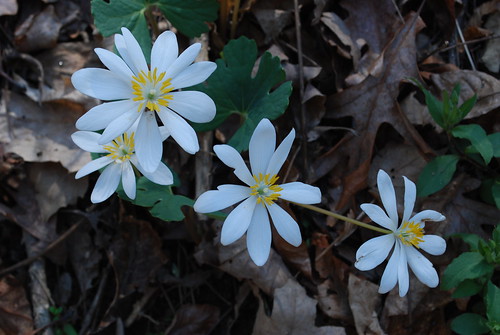
For the third year in a row, I flew south during March for a week-long retreat to a place where the soil is red, the wildflowers are already in bloom, and the sun is warm enough to justify stripping down to shorts and a t-shirt.
I didn’t read the newspaper, talk on the phone, use the internet, watch a television, or listen to a radio. For a whole week, I stopped worrying about what was happening in other parts of the world.
I worked on my manuscript, revising and rewriting parts that needed work. I wrote in my journal. I had time to meditate, to think, to write, to sit still. Silence is observed at the retreat house, so no one talked to me or interrupted my train of thought.
The only real contact I had with other human beings was the time I spent early in the week with a friend and his two daughters. We spent that time outside, walking along a river, eating lunch in the sun, and climbing a cool old tree that was covered with moss and (I realized much too late) old poison ivy vines. I couldn’t even complain about the light poison ivy rash that covered my arms by midweek: it felt like summer.
Since my yard at home was still snow-covered, I could not resist the sun-warmed flagstones around the fountain at the retreat house. Every day after lunch, I stretched out on them, my head on my fleece, to take a nap and absorb the heat. Down at the river bank, snakes had the same idea, and I saw three of them, each sliding away at the vibrations from my footsteps. As I walked along the paths, a wind rose, stirring the blossoms in the trees overhead, and petals fell into my hair.
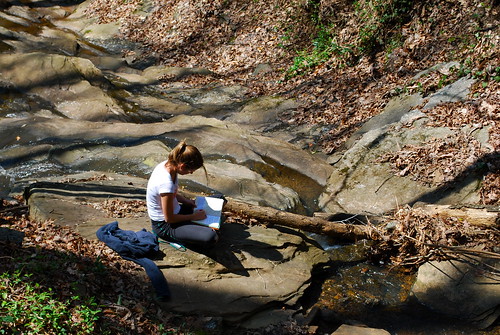
March 13, 2011
Airport blogging
Around me, travelers stumble about sleepily. Maybe, like me, they are taking dramamine. Or perhaps missing that one hour of sleep last night really made a difference. Airports can sometimes be a good place for people watching, but these folks look mostly bored and hungry.
It's spring break, and I'm flying south. I'm looking forward to feeling the sun on my skin, seeing flowers blooming, and having a whole week of quiet time to work on my book. I've been working on this manuscript for two years now, and I'm really ready to be done with it. I'll be getting together with a friend early in the week — and I'll probably do at least one outdoor tourist kind of thing, like visit the botanical gardens or the history center — but then I'm going to a retreat center to spend five days in silence.
It's spring break, and I'm flying south. I'm looking forward to feeling the sun on my skin, seeing flowers blooming, and having a whole week of quiet time to work on my book. I've been working on this manuscript for two years now, and I'm really ready to be done with it. I'll be getting together with a friend early in the week — and I'll probably do at least one outdoor tourist kind of thing, like visit the botanical gardens or the history center — but then I'm going to a retreat center to spend five days in silence.
March 11, 2011
March
March 09, 2011
What's red and not there?
The soups and stews I’ve made this winter have been especially good. The broth, which is almost always tomato-based because I’m vegan and I use tomatoes the way other people use meat, has tasted about ten times better than it has any other year.
At first I thought that maybe I had, out of the blue and with no warning, become an amazing chef. I figured maybe I’d gotten some kind of cooking super power, and suddenly I was Amazing Crockpot Woman.
The flaw with that thinking is that, when it comes right down to it, I haven't really changed the way I cook. I mostly chop up any vegetables I have, toss everything into a pot, and then add random spices.
Then I figured it out.
It’s not me, it’s the tomatoes.
Other years, I’ve used cans of store-bought tomatoes for the basis of soup or stew. I’ve been known to buy cases of them at the wholesale club.
But last August, when the CSA farm near me had piles of tomatoes that had gotten ripe all at once, I bought extra tomatoes and froze them. It seemed a shame to let all those beautiful tomatoes go to waste, and I liked the idea of eating food that grew within five miles of my house. My freezer was empty, because it had broken in July and I’d had to throw everything out before we finally got it fixed.
On that hot summer night, I stayed up late chopping tomatoes and boiling them down. I did it several weeks in a row, until I had lots of frozen blocks of tomatoes stacked neatly in my freezer. I wondered if it would be worth the effort — after all, canned tomatoes aren’t very expensive — but it felt satisfying to put food away for the winter. I got obsessed with filling the freezer. I felt like Laura Ingalls.
What I didn’t realize was that the tomatoes would taste about ten times better than the store-bought canned ones. I guess I should have thought of that, but it honestly came as a surprise. And it’s such a difference that now I’m spoiled. Just like I won’t buy tomatoes in the store this time of year – because ugh, they taste like nothing – I can’t imagine ever going back to the tasteless store tomatoes.
Remind me of that next August.
At first I thought that maybe I had, out of the blue and with no warning, become an amazing chef. I figured maybe I’d gotten some kind of cooking super power, and suddenly I was Amazing Crockpot Woman.
The flaw with that thinking is that, when it comes right down to it, I haven't really changed the way I cook. I mostly chop up any vegetables I have, toss everything into a pot, and then add random spices.
Then I figured it out.
It’s not me, it’s the tomatoes.
Other years, I’ve used cans of store-bought tomatoes for the basis of soup or stew. I’ve been known to buy cases of them at the wholesale club.
But last August, when the CSA farm near me had piles of tomatoes that had gotten ripe all at once, I bought extra tomatoes and froze them. It seemed a shame to let all those beautiful tomatoes go to waste, and I liked the idea of eating food that grew within five miles of my house. My freezer was empty, because it had broken in July and I’d had to throw everything out before we finally got it fixed.
On that hot summer night, I stayed up late chopping tomatoes and boiling them down. I did it several weeks in a row, until I had lots of frozen blocks of tomatoes stacked neatly in my freezer. I wondered if it would be worth the effort — after all, canned tomatoes aren’t very expensive — but it felt satisfying to put food away for the winter. I got obsessed with filling the freezer. I felt like Laura Ingalls.
What I didn’t realize was that the tomatoes would taste about ten times better than the store-bought canned ones. I guess I should have thought of that, but it honestly came as a surprise. And it’s such a difference that now I’m spoiled. Just like I won’t buy tomatoes in the store this time of year – because ugh, they taste like nothing – I can’t imagine ever going back to the tasteless store tomatoes.
Remind me of that next August.
March 07, 2011
But it's spring snow
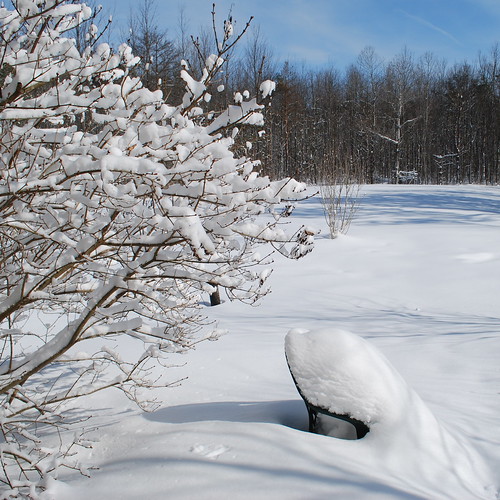
I spent this morning shoveling the snow a storm dumped on us last night. It's what we call lake effect snow, and it's pretty common for us to get hit with a snowstorm or two during March.
We had parked out cars near the end of the driveway, so my husband was able to leave for work, and Shaggy Hair Boy for his piano lesson, but I worked at home today, taking half an hour to go out in the sunshine and shovel every time I felt like I needed a break. Shoveling snow is an appealing option when you're home grading papers.
This scene may look like winter, but really, it's spring snow. By late afternoon, the sun was already working on the sections of the driveway I'd shoveled, and I could even see some of the gravel. In my winter coat and mittens, I felt almost warm.
It's only a matter of time.
March 06, 2011
And February was so long it lasted into March
Six years ago, when I first talked on my blog about how difficult the month of February was for me, several readers emailed me to ask, “Do you know the song Dar Williams sings about February?” And every February, at least one reader tells me again to listen to Dar Williams.
On Friday night, as a reward for surviving February, I went with friends to a Dar Williams concert. It was an intimate setting, a whole bunch of local people crowded into the wooden pews of a Unitarian Universalist Church. Filled with hot soup and salad and homemade bread, wedged between Quilt Artist and Makes Bread, I listened while Dar Williams sang and talked and utterly charmed her audience. I knew I’d love the songs, since I’d heard them before, but I loved equally her self-deprecating sense of humor and the anecdotes that accompanied each song. She said things like, “And THEN I got to be in People Magazine. It was exciting. One by one, my friends went to the dentist and saw it.”
During intermission, my friends and I drank tea, ate cookies, and talked about what a great time we were having. I saw people from the community I hadn’t talked to in years. A former student came up to give me a hug and announce that another former student had had twins that morning.
Saturday night, I took a road trip with my sons to hear jazz pianist Dick Hyman. (I’d use a pseudonym for him, but anything I come up with sounds like a “That’s What She Said” joke.) We got there when the doors opened, and we sat maybe 20 feet away from the black grand piano. I could see both his hands the whole time he was playing. He played many of the old standards, beginning with Ain’t Misbehavin' and Honeysuckle Rose. He’d stop and talk about each piece he played, telling us bits of trivia about Cole Porter or Bix Beiderbecke or George Gershwin, and it was clear that he loved the music he was playing. At the end, he said, “Oh, wait, one more thing,” and leaned over to play Over the Rainbow. He’s 82 years old, so I imagine he was tired after the concert, but he still hung around afterward and chatted with us, talking to my sons about the music they play.
That’s how I celebrated the beginning of March: folk music with my friends, jazz piano music with my sons, and then a late night Saturday movie with my husband. This morning, I picked up Little Biker Boy so he could come build a fire in the fireplace (something he loves to do) before we run out of cold weather. When I went out to the car to take him home, at least 6 inches of snow had fallen.
It might look like winter, but I know it’s March. Spring will come eventually.
On Friday night, as a reward for surviving February, I went with friends to a Dar Williams concert. It was an intimate setting, a whole bunch of local people crowded into the wooden pews of a Unitarian Universalist Church. Filled with hot soup and salad and homemade bread, wedged between Quilt Artist and Makes Bread, I listened while Dar Williams sang and talked and utterly charmed her audience. I knew I’d love the songs, since I’d heard them before, but I loved equally her self-deprecating sense of humor and the anecdotes that accompanied each song. She said things like, “And THEN I got to be in People Magazine. It was exciting. One by one, my friends went to the dentist and saw it.”
During intermission, my friends and I drank tea, ate cookies, and talked about what a great time we were having. I saw people from the community I hadn’t talked to in years. A former student came up to give me a hug and announce that another former student had had twins that morning.
Saturday night, I took a road trip with my sons to hear jazz pianist Dick Hyman. (I’d use a pseudonym for him, but anything I come up with sounds like a “That’s What She Said” joke.) We got there when the doors opened, and we sat maybe 20 feet away from the black grand piano. I could see both his hands the whole time he was playing. He played many of the old standards, beginning with Ain’t Misbehavin' and Honeysuckle Rose. He’d stop and talk about each piece he played, telling us bits of trivia about Cole Porter or Bix Beiderbecke or George Gershwin, and it was clear that he loved the music he was playing. At the end, he said, “Oh, wait, one more thing,” and leaned over to play Over the Rainbow. He’s 82 years old, so I imagine he was tired after the concert, but he still hung around afterward and chatted with us, talking to my sons about the music they play.
That’s how I celebrated the beginning of March: folk music with my friends, jazz piano music with my sons, and then a late night Saturday movie with my husband. This morning, I picked up Little Biker Boy so he could come build a fire in the fireplace (something he loves to do) before we run out of cold weather. When I went out to the car to take him home, at least 6 inches of snow had fallen.
It might look like winter, but I know it’s March. Spring will come eventually.
March 04, 2011
Exploring Big Bend
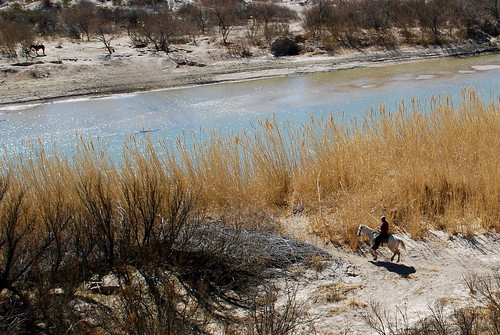
We had only two days of hiking in the desert — it was just a weekend trip, but we managed to see the best parts of the national park. I was surprised, actually, at the utter lack of tourists in what was a spectacular landscape. At several trailheads, our rental car was the only vehicle. The young woman at the visitor center told us that things get busy in March, when college students are on spring break.
Along the shallow river, men sometimes came riding across on horses, usually carrying handmade trinkets — including scorpions made of wire — that they’d spread out on a flat rock. They were always careful to give prices in terms of “suggested donations” since selling things across the border is illegal. One man told us that both countries used to be very casual about the border crossings, and that boat trips often meandered back and forth, with Americans going into the little Mexico towns for drinks and food, but that the Americans had gotten stricter in 2002.
We did see some wildlife, including roadrunners who looked very much like the cartoon version I’d grown up with, minus the sound effects. I liked that we were hiking in the presence of mountain lions, but we never actually saw one: no doubt they’d found a place to sleep in the shade. We came across a pack of javelinas, who looked tough and prickly, as you might expect in that climate, jack rabbits who darted in front of the car, and a coyote trotting along at dusk.
Late one afternoon, we found out where the handful of Americans in the park were hanging out: a natural hot spring on the edge of the river. Years ago, the place had been a working spa, and the old walls of the bath area were still in tact. After several hours of hiking, it felt great to relax in the warm water. The afternoon sun glinted off the river that swirled past, and golden grasses swaying in the breeze all around us. No one talked much: we sat lazily, while on the other side of the river, a couple of men napped in the shade of an old tree and a burro chewed on dry grass.
In our search for supplies one morning, we drove through a ghost town. The town had been built over a hundred years ago when mercury mining in the area was profitable. The thing that struck me most about the abandoned houses is that there were no trees or plants to cover them up: the desert landscape is stark. We walked around the little cemetery, where rocks and crosses marked the graves of those who had lived and worked here long ago.
On our last morning, we drove along a windy road into the mountains. Hidden in a valley, with peaks on every side, was an oasis with more vegetation that we'd seen the whole trip. We found a spot where we could sit in the shade and enjoy the breeze. I could see why early humans would have made this their home: having mountains on all sides made me feel protected.
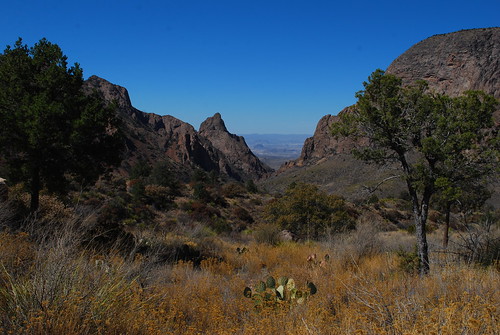
March 02, 2011
Shade

After hiking through the sunny desert, my skin felt taut, the heat soaking all the way through to my bones. I crossed a dry stream bed, climbed up over some boulders, and then stepped into the welcoming shade of a side canyon. The cool air of the canyon rushed over my bare skin, and I could feel the muscles in my face relaxing as my eyes took a break from the harsh sunlight. The river moved through so slowly it didn’t even make a sound, and piles of sand had washed up against the rocks, leaving soft places to sit. We saw just two other hikers, an older couple, who were climbing up out of the canyon as we were climbing down into it. The woman smiled at me as she paused to take a drink from her water bottle. The man spoke in a low tone, as if he were in church or perhaps a library, “You can gather your thoughts in a place like this.”
March 01, 2011
Not-so-big river

The woman in the general store looked at me like I was crazy when I explained to her what I wanted on my sandwich.
“No meat? No cheese?” she asked. It seems that the Lone Star State is not known for vegan food. But the sandwich she made for me, slices of ripe avocado with cucumber and lettuce on a fresh roll, tasted delicious.
We told her about the hike we’d taken that morning in the national park, and she assured us that we needed to drive west. “It’s the second most scenic drive in the country,” she said.
“What’s the first?” my husband asked. I could tell he was trying to test her.
“Route 1 in California,” she said without hesitation.
My husband turned to me. “She's right.”
“I guess we better take the drive then,” I said. The woman smiled in approval.
We took the drive in the late afternoon, when the sun was glinting off the shallow river that forms the border between the countries. The narrow road went up steep hills, taking us high up above the river, and then down into the valley along the river.
This river has been on every map of North America I’ve ever seen — including the huge one that hung on the wall of my first grade classroom — and I always pictured something way bigger. I mean, the name of it even means “big river” so you can see how I might imagine a big river. But in several places, I could have walked across the river easily without even getting my shoulders wet.
Apparently, the river has indeed gotten smaller since I was in first grade, since so much water is diverted for irrigation and other human use. Besides, we were driving through the driest landscape I’d ever been in — local folks said that they hadn’t had rain since September — and in that context, even this shallow, slow-moving river seemed important. Any water at all in that desert landscape seemed miraculous.
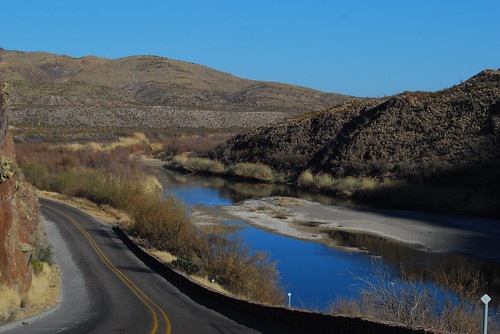
Subscribe to:
Comments (Atom)

